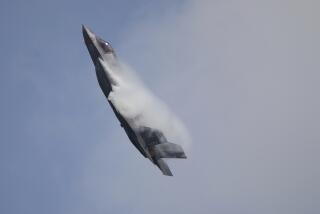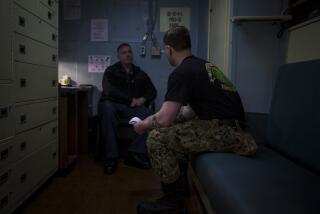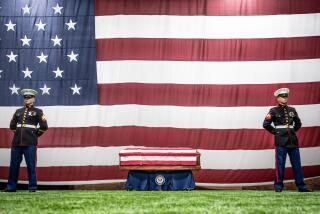Home Base Gives Emotional Welcome to Spy Plane Crew
- Share via
OAK HARBOR, Wash. — The crew members of the Navy surveillance plane held in China for 11 days were welcomed back to their home base Saturday with a tumultuous greeting from thousands of well-wishers and an emotional reunion with their families.
As a Navy jet lumbered to a stop and its door popped open, the crew’s 21 men and three women officially returned to Whidbey Island Naval Air Station, home to the military’s most secret surveillance aircraft. Dressed in green flight suits, the 24 Americans smartly saluted the naval officers receiving them, but then broke off and ran into the arms of relatives racing toward them on the tarmac.
The returnees’ day started early at Hickam Air Force Base in Honolulu, where the plane’s pilot, Lt. Shane Osborn, gave his first public account of the terrifying midair collision with a Chinese fighter jet April 1 that forced the crew to make an emergency landing on China’s Hainan island. He also described what occurred during the crew’s detention.
“I’m here to tell you we did it right,” the fresh-faced 26-year-old mission commander from Norfolk, Neb., said. “No apology is necessary on our part.”
He and his crew were well treated by the Chinese, but they suffered from sleep deprivation during interrogation, he said.
The Chinese pilot flew within a few feet of his plane and made harassing gestures before striking it on his third pass, tearing his own plane apart and sending the larger American craft into a rolling dive, Osborn said.
“The first thing I thought was, ‘This guy just killed us,’ ” Osborn said, adding that he remembered “looking up and seeing water, and seeing another plane smoking toward the Earth with flames coming out of it.”
He laid the blame for the accident squarely on the Chinese fighter jet, whose pilot was last seen bailing out.
“Contrary to some releases, our aircraft was straight, steady, holding altitude, heading away from Hainan, on autopilot when the accident occurred,” Osborn said. “The sharp left turn people were talking about was when the aircraft went out of control.” The Chinese military initially said the U.S. plane had made an abrupt left turn and struck its fighter jet.
Senior Chief Petty Officer Nicholas Mellos, second in command of the plane, had a simple description of the atmosphere inside after it was struck: “Mayhem.” But, he added quickly, the crew’s training kicked in immediately, despite the loss of aircraft controls, violent shuddering and near-deafening wind noise.
The plane had lost pressurization and its airspeed indicator, and its nose cone was gone, Osborn said. At one point, he shut down the engine.
“I could not hold altitude at 15,000 feet,” he said. “I took it to about 10,000 feet until it started holding.”
That was when the crew began destroying sensitive computer data and equipment lest they fall into the wrong hands. Osborn would not specify how much the crew was able to accomplish, or whether the job continued after he managed to land on Hainan.
Once on the ground, the crew was subjected to grueling interrogations at all hours but otherwise treated well, he said.
“They were polite to us and respectful,” Osborn said. “We were seen by doctors. They obviously fed us well.
“The only unpleasant part was the interrogation and the lack of sleep,” he said. “The first session was 4 1/2 to five hours, starting in the middle of the night. From then on, it was a definite lack of sleep, different wake-up calls at all times.”
Crew members speaking to the media after a welcoming ceremony Saturday on Whidbey Island said the Chinese interrogators were interested in the sophisticated plane’s equipment but received no information from the detainees. Lt. j.g. Richard Payne of Pampa, Texas, said he was asked repeatedly to apologize for the incident. He said he--like the others--refused.
Once the pilots had managed to wrestle the crippled plane to the ground, the aircraft was immediately surrounded and boarded by Chinese military personnel, they said. They said the Chinese did not behave aggressively but seemed surprised.
The crew was removed from the plane and eventually taken to officers’ housing on the base. The crew members said that, at first, they were allowed to mingle among themselves but that soon they were moved to other quarters. The three women were placed together, apart from the men, said Petty Officer 2nd Class Wendy Westbrook of Rock Creek, Ohio.
Crew members were confined to their rooms and allowed out only to eat and be interrogated. The Chinese were accommodating about feeding the Americans a diet they would be accustomed to, but the food was heavy on rice and didn’t include much meat or vegetables.
More details also emerged about the mind-set of the crew in the harrowing moments just after the accident. As they buckled on parachutes and attempted to right the plane, most of the crew members said, they whispered urgent prayers.
“I thought to myself, ‘I’m 20 years old, I’ve had a good life, I love my family.’ I said my prayers,” said Petty Officer 3rd Class Jeremy Crandall of Poplar Grove, Ill.
Petty Officer 1st Class Josef Edmunds of Davis, Calif., remembered being thrown to the floor of the plane and turning to Petty Officer 2nd Class Brandon Funk of Showlow, Ariz., saying: “That’s it. I’m getting married.” When the crew stopped in Guam on the way home, Edmunds called his girlfriend and proposed. She accepted and stood beaming beside him after his arrival.
It has been two weeks since the crew’s ordeal began, setting in motion one of the most tense and uncertain episodes in the post-Cold War period.
Since the announcement of the crew’s release, the Navy-saturated town of Oak Harbor has been rushing to plan a celebration adequate to convey its affection.
An elaborate program had been planned for Saturday, including a parade through town. Had the festivities gone as originally planned, the crew’s day would have stretched from dawn to well into the evening. But once the crew got wind of that, the program was drastically cut.
The abbreviated but moving welcome was set to the strains of “Anchors Aweigh” and other military anthems but also to the hoots and cheers of well-wishers.
*
Staff writer Cart reported from Washington and special correspondent Essoyan from Hawaii.
More to Read
Sign up for Essential California
The most important California stories and recommendations in your inbox every morning.
You may occasionally receive promotional content from the Los Angeles Times.














